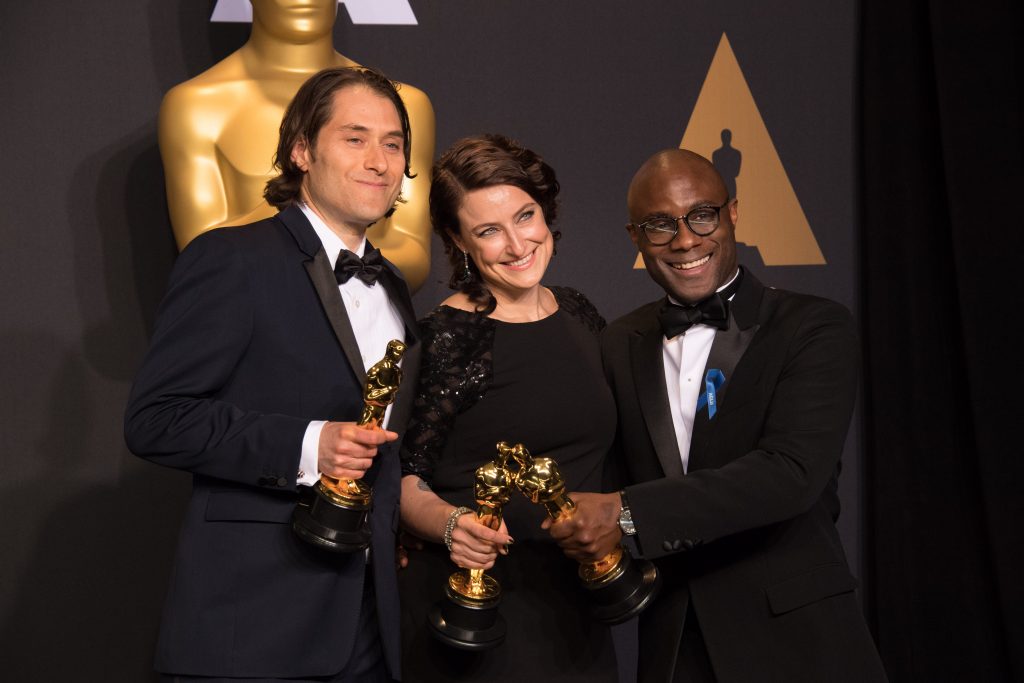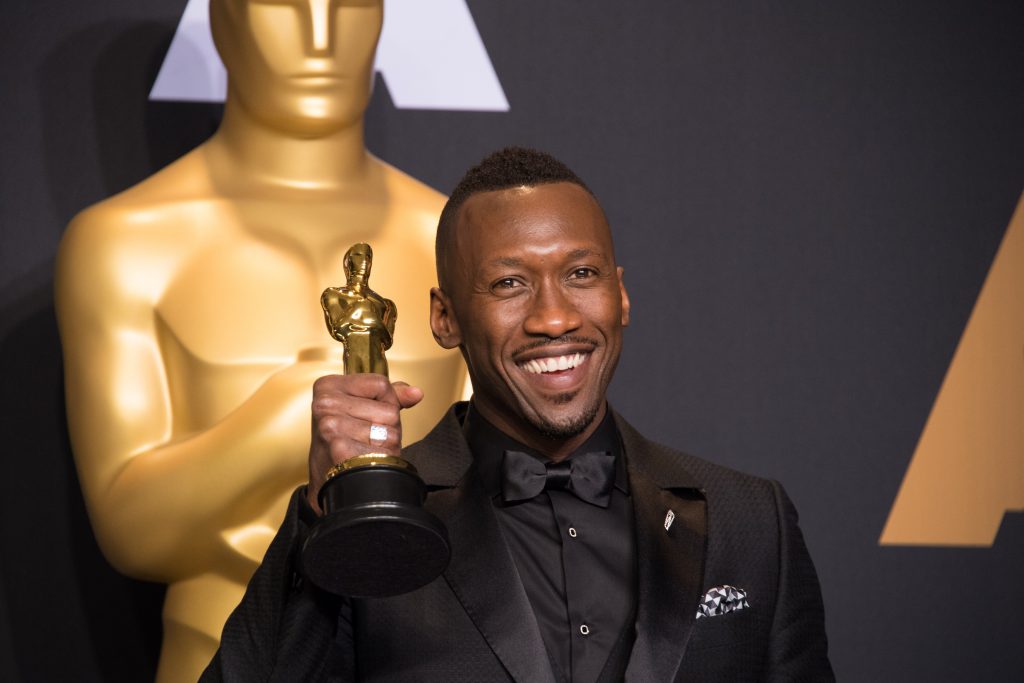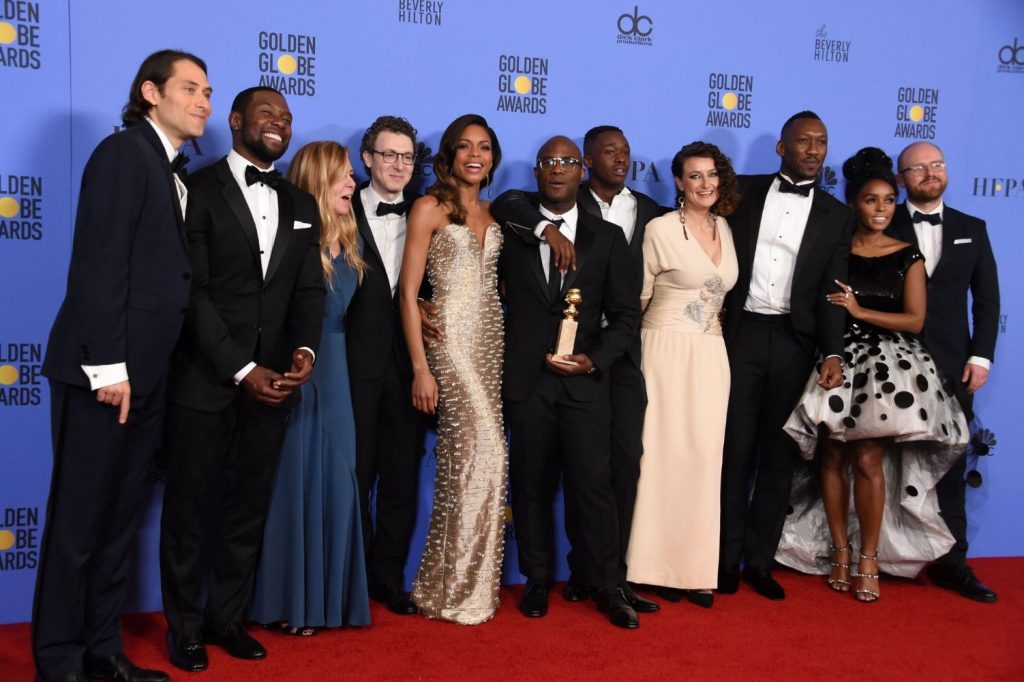February 28, 2017
by Carla Hay
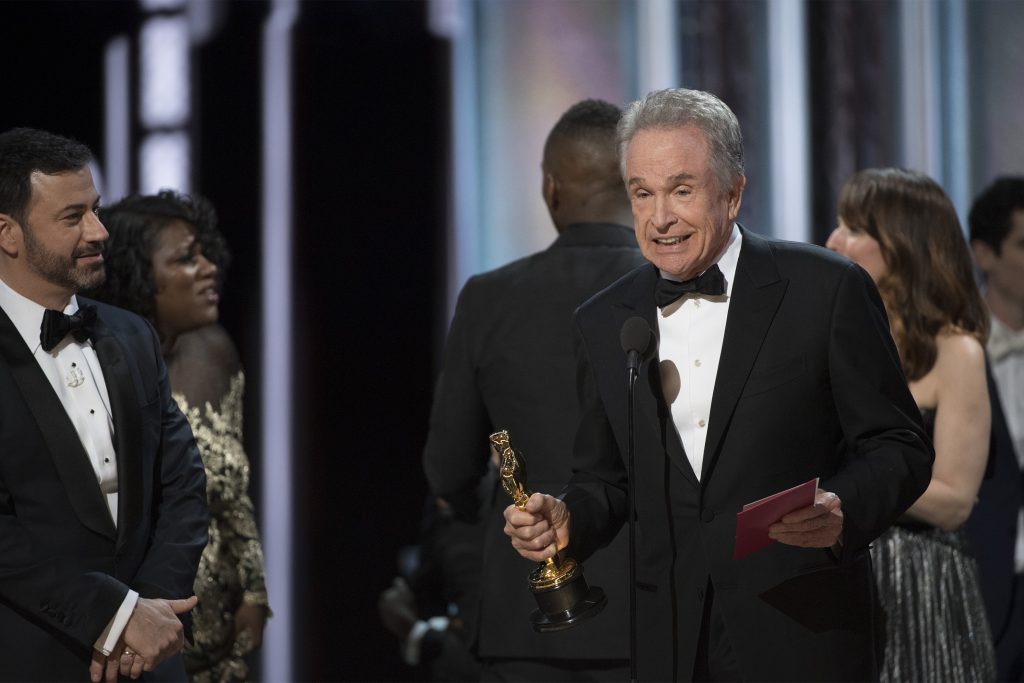
It didn’t take long for the conspiracy theories to start after the biggest mistake in Oscar history was broadcast live for millions of people around the world to see at the 89th Annual Academy Awards, which took place the Dolby Theatre in Los Angeles on February 26, 2017.
To recap, in case you’re one of the few people who haven’t heard about it yet: The wrong winner was announced for Best Picture. The producers of the contemporary musical “La La Land” were on stage for an entire two minutes while giving their acceptance speeches when it was announced that “La La Land” was not the winner for Best Picture. The coming-of-age drama “Moonlight” was, in fact, the real winner. The “La La Land” team had to literally hand over the Oscars they thought they had won to the “Moonlight” team. How embarrassing.
It was determined that the wrong envelope had been given to presenters Warren Beatty and Faye Dunaway, who therefore announced the wrong winner. The video of this incident quickly went viral, but many people on the Internet started spreading stories that the whole thing was a rigged publicity stunt to boost the Oscar ceremony’s ratings. This conspiracy theory couldn’t be farther from the truth, and here’s why:
PricewaterhouseCoopers, the longtime accounting firm for the Academy Awards, has a legally binding contract to not reveal the voting results to anyone other than to a select few people at the firm. Not even the Oscar telecast’s producers, host or the network executives (the people who would have the most to gain from publicity stunts for the show) know who won until the winner is announced on stage. The Oscar statuettes handed out on stage do not have the winners’ names on the statuettes—the winners’ names are engraved on these awards after the ceremony.
https://www.youtube.com/watch?v=1cF37KPBS6g
PricewaterhouseCoopers, which issued a formal apology for the envelope error, makes such a big deal out of showing the locked briefcases where the Oscar envelopes are held, that the two PricewaterhouseCoopers employees entrusted with this responsibility of handing out the sealed envelopes actually walk the red carpet and pose for pictures with the briefcases. Each employee carries the same envelopes in case something happens that would prevent one of the employees from handing over the envelopes in time.
Because of the millions of dollars at stake, PricewaterhouseCoopers would not put their business and reputation on the line for such an elaborate publicity stunt that would only harm the company. The Academy of Motion Picture Arts and Sciences, whose members do the Oscar voting, also issued a separate apology, even though PricewaterhouseCoopers is taking full responsibility for the fiasco.
And if it were a publicity stunt, it was a poorly timed stunt that didn’t work. Why wait until the very end of the show (which dragged on way past its scheduled end time) to do it? It would have made more sense to pull a publicity stunt at the beginning of the show or before the show in order to get people to tune in for higher ratings. According to the Nielsen Company and The Hollywood Reporter, ratings for this year’s Oscars dropped to 32.9 million U.S. viewers, which is a 4 percent decrease from the previous year.
The fact that the mistake wasn’t corrected for two whole minutes (which is a long time on live TV) indicates that the show’s producers didn’t know what a humiliating, colossal mistake had been made on their live TV broadcast. Beatty, Dunaway and the “La La Land” team certainly didn’t know who the winner was in advance, because it would be insane and financially non-beneficial to them to embarrass themselves on TV in this manner for the sake of boosting TV ratings.
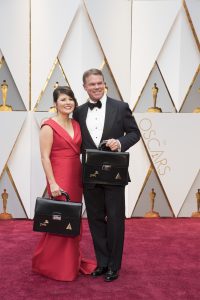
PricewaterhouseCoopers’ U.S. chairman Brian Cullinan and Martha Ruiz, two of the company’s employees who had the responsibility of handing out the correct envelopes during the Oscar ceremony, were among the few people who knew in advance who the real winner was. Why did it take them so long to correct the mistake on stage? That is currently being “investigated,” according to PriceWaterhouseCoopers. Sometimes a mistake this big really does happen because of an unintentional error. It’s time to let the conspiracy theories go.
March 1, 2017 UPDATE: PricewaterhouseCoopers and the Academy have announced that Cullinan and Ruiz have now been prohibited from any PricewaterhouseCoopers activities related to the Oscars.
Here are five other “alternative facts” (in other words, things that aren’t true) about recent Academy Awards that have spread over the Internet and by some media outlets, along with the real truth to debunk the false reports:
Are Ben Affleck and Casey Affleck the first brothers to win Oscars?
No. In a backstage interview at the 2017 Academy Awards, Casey Affleck (winner of Best Actor, for “Manchester by the Sea”) said that he and his older brother Ben Affleck are the only brothers to win Oscars. In fact, brothers Joel and Ethan Coen each won three Oscars on the same night for directing, writing and producing the 2007 movie “No Country for Old Men.” The Coen brothers won the awards for Best Picture, Best Director and Best Adapted Screenplay. Ben Affleck has two Oscars: Best Picture (for producing the 2012 drama “Argo”) and Best Original Screenplay (for co-writing the 1997 drama “Good Will Hunting.”) Ben Affleck has not received Oscar nominations as an actor or director; he was famously snubbed by not getting an Oscar nomination for directing or starring in “Argo.”
Is “Moonlight star” Mahershala Ali the first Muslim to win an Oscar?
No. Because religion is such a sensitive and private issue for many, it’s difficult to know who really was the first Muslim to actually win an Oscar. It may be obvious to look to the Best Foreign Film category to make assumptions about which Oscar winners were Muslim (for example, the 2011 Iranian film “A Separation” won in that category), but the Academy Awards have many lower-profile categories such as technical awards and short-film awards that a Muslim could have won in those categories long before “Moonlight” star Ali won an Oscar for Best Supporting Actor. As for the Oscar categories for actors and actresses, Iranian-American actress Shohreh Aghdashloo, who has openly discussed being Muslim, won an Oscar for Best Supporting Actress for the 2003 drama “House of Sand and Fog.”
Is Sam Smith the first openly gay person to win an Oscar?
No. In 2016, Oscar winner Sam Smith mistakenly declared in his acceptance speech that he was the first openly gay person to win an Oscar. Smith—whose “Writing’s on the Wall” tune (from the James Bond film “Spectre”) won the Oscar for Best Original Song—was soon corrected on social media that he wasn’t the first openly gay person to win an Oscar. Elton John won the same Oscar for co-writing the 1994 “The Lion King” hit song “Can You Feel the Love Tonight.” Smith later made a public apology for his mistake.
Did “Moonlight” writer/director Barry Jenkins become the first African-American to win an Oscar for Best Picture?
No. An African-American has not yet won this prize. However, “12 Years a Slave” director/producer Steve McQueen (who is British) became the first black person to win an Oscar for Best Picture. The Oscar for Best Picture goes to the eligible producer(s) of the film, not the director or the stars of the movie, unless a director or star of the movie is also one of the eligible producers of the film.
In the case of “Moonlight,” the Oscar for Best Picture was awarded to producers Jeremy Kleiner, Dede Gardner and Adele Romanski, who are all Caucasian. Jenkins was not one of the producers of “Moonlight.” Kleiner and Gardner also previously won a Best Picture Oscar for the 2013 film “12 Years a Slave,” whose Oscar-winning producers also included McQueen, Brad Pitt and Anthony Katagas.
Did “Moonlight” writer/director Barry Jenkins become the first African-American to win an Oscar in a screenplay category?
No. Geoffrey S. Fletcher became the first African-American to win a screenplay Oscar for the 2009 movie “Precious: Based on the Novel ‘Push’ by Sapphire.” Fletcher received the prize for Best Adapted Screenplay. John Ridley, who is also African-American, won the same award for “12 Years a Slave.”

